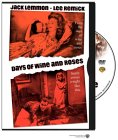| Reviews & Columns |
|
Reviews DVD TV on DVD Blu-ray 4K UHD International DVDs In Theaters Reviews by Studio Video Games Features Collector Series DVDs Easter Egg Database Interviews DVD Talk Radio Feature Articles Columns Anime Talk DVD Savant Horror DVDs The M.O.D. Squad Art House HD Talk Silent DVD
|
DVD Talk Forum |
|
|
| Resources |
|
DVD Price Search Customer Service #'s RCE Info Links |
|
Columns
|
|
|
Days of Wine & Roses
The story concerns a middle-executive PR man, Joe Clay (Jack Lemmon), whose unrewarding, high-pressure job of wining and dining clients (and frequently providing hookers for them) has turned him into an alcoholic, though he is unaware of this at first. He falls for an eventually marries a pretty secretary, Kirsten (Lee Remick), a teetotaler whose addictive personality falls prey to Joe's need for a drinking buddy. Soon their drinking is totally out of control -- she accidentally sets their apartment on fire and he is fired from several jobs. They struggle to get their lives back on track, but their addictions are on different courses, and too much of their relationship is built around booze, a "threesome," as Joe calls it.
Days of Wine and Roses began as a 1958 episode of the classic television anthology Playhouse 90. That version starred Cliff Robertson and Piper Laurie, and was directed by John Frankenheimer. It's been years since this reviewer saw that version, but remembers Laurie's performance as being superior to Remick's. Remick is fine, but doesn't quite transform herself to the shocking degree that Laurie did in the TV play.
Lemmon again plays the kind of everyman role that earned him his immortality. At 117 minutes, the film version of Days of Wine and Roses feels padded. There are added bits of light comedy, which are inoffensive and effectively played by Lemmon but which seem out of place in a movie about alcoholism. For instance, there is a long pantomimed sequence where a drunk Joe comically bumps into a glass window and whose bouquet of flowers gets caught in an elevator door. Likewise, Henri Mancini's popular title song may have won the Oscar, but likewise plays like a bid to make the downbeat movie more commercially viable.
Despite the padding, writer JP Miller and director Blake Edwards are admirably methodical, unfolding the film's story and developing its characters with enormous care and precision. Blake shoots all the early scenes very matter-of-factly, but as Joe hits bottom, Edwards's gradual stylization (more point-of-view shots, extreme angles) is subtly done. And even now, Joe and Kirsten's decline is tough to watch. Lemmon breaks away from his usual fidgeting to really lose himself in the role as Joe nearly goes mad drying out in an alcoholic ward.
Besides Lemmon and Remick, the film features a very strong, quietly authoritative performance by Charles Bickford as Remick's stern father. (Bickford also appeared in the TV version, and had experience with drunks, having grappled with James Mason in A Star Is Born.) Jack Klugman, saddled with an unfortunate role that reads like an AA manual, is such a good, humanist actor superb playing self-aware losers, that he makes all his scenes work. Finally Alan Hewitt, an actor remembered mainly for his roles in Disney-type comedies, is subtly menacing as Lemmon's manipulative supervisor.
Video & Audio
Warners did a fine job with Days of Wine and Roses, giving it a splendid 16:9 transfer with very black blacks and a razor sharp image. Essentially a two character piece, there's not a whole lot going on visually, but the transfer inarguably captures all the nuances of the performances. Much of the film was shot night-for-night, and looks exceptionally good during these scenes. The Dolby Digital mono sound is fine, and the disc features English, French, and Spanish subtitles, and is closed-captioned.
Extras
Blake Edwards contributes a frank audio commentary track, in which he discusses how he was chosen over Frankenheimer, and how his approach to the material differed from the TV version. Also included is a vintage interview with Jack Lemmon from 1962 that will doubtlessly confuse many viewers. The 4:3 presentation consists of Jack Lemmon answering unheard questions into a telephone. He occupies the left half of the image, while the right half is completely black. This goes completely unexplained on the DVD, but was obviously a packaged interview distributed by Warner Bros. to, presumably, the top local news markets around the country. They would then insert their own anchormen into the film to "interview" Lemmon. However, since Warner Bros. does not include text for the questions, and since Lemmon sits there for long stretches nodding but saying nothing, the effect is less like an interview and more like watching Jack Lemmon take a call. (This reviewer once worked as an archivist at Warner Bros., and stumbled upon cases of LPs which similarly featured Rex Harrison absolutely delighted to be discussing My Fair Lady with no one in particular.) Lemmon also makes a personal appeal for audiences to go see Days of Wine and Roses in two 16:9 trailers which are also included.
Stuart Galbraith IV is a Los Angeles and Kyoto-based film historian whose work includes The Emperor and the Wolf -- The Lives and Films of Akira Kurosawa and Toshiro Mifune. He is presently writing a new book on Japanese cinema for Taschen.
|
| Popular Reviews |
| Sponsored Links |
|
|
| Sponsored Links |
|
|
| Release List | Reviews | Shop | Newsletter | Forum | DVD Giveaways | Blu-Ray | Advertise |
|
Copyright 2024 DVDTalk.com All Rights Reserved. Legal Info, Privacy Policy, Terms of Use,
Manage Preferences,
Your Privacy Choices | |||||||














